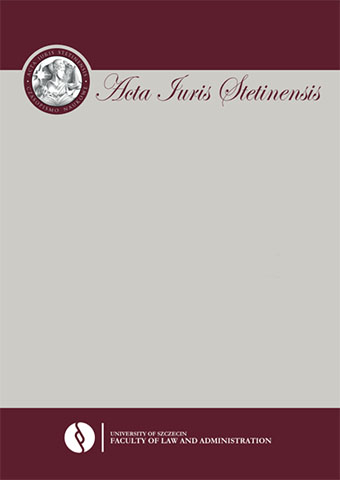






| Authors: |
Marcin
Byczyk
Universität Passau, Niemcy |
| Keywords: | criminal law nullum crimen sine lege certa principle norms of cautiousness congruity of the norms of substantial criminal law with the constitutional regulations |
| Data publikacji całości: | 2018 |
| Page range: | 24 (141-164) |
| Downloads ?: | 632 |
| 1. | Ambos K., 100 Jahre Belings „Lehre vom Verbrechen”: Renaissance des kausalen Verbrechensbegriffs auf internationaler Ebene?, „Zeitschrift für Internationale Strafrechtsdogmatik” 2006, nr 10. |
| 2. | Badar M.E., The Concept of Mens Rea in International Criminal Law, Oxford 2013. |
| 3. | Binder G., The Rhetoric of Motive and Intent, „Buffalo Criminal Law Review” 2003, nr 6:1. |
| 4. | Blackstone W., Commentaries on the Laws of England, Chicago 1979. |
| 5. | Bogomilska-Król M., Formy winy w prawie karnym w świetle psychologii, Warszawa 1991. |
| 6. | Byczyk M., Normy ostrożności w prawie karnym, Poznań 2016. |
| 7. | Colombi Ciacchi A., Fahrlässigkeit und Tatbestandsbestimmtheit. Deutschaland und Italien im Vergleich, München 2005. |
| 8. | Colombi Ciacchi A.L.B., Fahrlässigkeit und Tatbestandsbestimmtheit. Deutschland und Italien im Vergleich, München 2005. |
| 9. | Dębski R., Typ czynu zabronionego (typizacji), w: System Prawa Karnego. Nauka o przestępstwie. Zasady odpowiedzialności, red. R. Dębski, Warszawa 2013. |
| 10. | Duttge G., Die Fährlässikgeit im Lichte des Bestimmtheitsgebotes, JZ 2014, nr 6. |
| 11. | Duttge G., Fährlässikgeit und Bestimmtheitsgebot w: Festschrift für Günter Kohlmann, red. H.J. Hirsch, J. Wolter, W. Brauns, Köln 2003. |
| 12. | Engisch K., Untersuchungen über Vorsatz und Fahrlässigkeit, Berlin 1930. |
| 13. | Exner E., Das Wesen der Fahrlässigkeit, Leipzig 1910. |
| 14. | Feuerbach P.J.A., Bibliothek für die peinliche Rechtswissenschaft und Gesetzeskunde, t. II, Giesen 1800. |
| 15. | Feuerbach P.J.A., Lehrbuch des gemeinen in Deutschland gültigen peinlichen Rechts, Gießen 1826. |
| 16. | Fletcher G., Grammar of Criminal law, New York, Oxford 2007. |
| 17. | Frankowski S., Przestępstwa kierunkowe w teorii i praktyce, Warszawa 1970. |
| 18. | Giunta F., I tormentati rapporti fra colpa e regola cautelare, Dirito penale e processo 1999. |
| 19. | Gordon G.H., Criminal responsibility in Scots law, nieopublikowana praca doktorska, Glasgow 1960. |
| 20. | Hermann J.B., Begriffsrelativität im Strafrecht und das Grundgesetz, Bayreuth 2014. |
| 21. | Hilgendorf E., Contemporary German Criminal Jurisprudence, „Peking University Law Journal” 2013, z. 1. |
| 22. | Hruschka J., Der Begriff der actio libera in causa und die Begründung ihrer Strafbarkeit – BGHSt 21, 318, JS 1968. |
| 23. | Hsü Yü-hsiu, Die objektive Zurechnungslehre in Taiwan, w: Festschrift für Claus Roxin zum 70. Geburtstag am 15 Mai 2001, red. B. Schünemann, H. Achenbach, W. Bottke, B. Haffke, H-J. Rudolphi, München 2001. |
| 24. | Husak D. Strict Liablity, Justice and Proportionality, w: D. Husak, The Philosophy of Criminal Law, Oxford 2010. |
| 25. | Kirsch F.A., Zur Geltung des Gesezlichkeitsprinzips im Allgemeinen Teil des Strafgesetzbuchs, Berlin 2014. |
| 26. | Klein E.F., Grundsätze des Gemeinen Deutschen Peinlichen Rechts, Halle 1799. |
| 27. | Konarska-Wrzosek V., Dyrektywy sądowego wymiaru kary, Toruń 2002. |
| 28. | Kudlich H., Die Verletzung gesetzlicher Sondernormen und ihre Bedeutung für die Bestimmung der Sorgfaltspflichtverletzung, w: Festschrift für Harro Otto, red. G. Dannecker, |
| 29. | W. Langer, O. Ranft, R. Schmitz, J. Brammsen, Köln/Berlin 2007. |
| 30. | Luisi L., O tipo penal, a teoria finalista e a nova legislação penal, Porto Alegre 1987. |
| 31. | Maisonnave G.A., Análisis dogmático y práctico del delito de infracción de deber, „Revista CADE: doctrina y jurisprudenci” 2014 nr 28. |
| 32. | Majewski J., Prawnokarne przypisanie skutku przy zaniechaniu (zagadnienia węzłowe), Kraków 1997. |
| 33. | Mańkowski B., Socjalistticzeskaja zakonnost, 1945, nr 1–2. |
| 34. | Mir J.C., Der Einfluss von Welzel und der finalen Handlungslehre im Allgemeinen in der Strafrechtswissenschaft von Spanien und den iberoamerikanischen Ländern, |
| 35. | „Zeitschrift für Internationale Strafrechtsdogmatik” 2009, nr 5. |
| 36. | Moran M., Rethinking the reasonable person. An Egalitarian Reconstruction of the Objective Standard, Oxford 2003. |
| 37. | Pohl Ł., Struktura normy sankcjonowanej (zagadnienia ogólne), Poznań 2007. |
| 38. | Sartori D., The lex certa principle. From the Italian Constitution to the European Convention on Human Rights, niepubl. praca doktorska opracowana na Universita degli Studi di Trento, Trento 2014. |
| 39. | Sauera D., Die Fahrlässigkeitsdogmatik der Strafrechtslehre und der Strafrechtsprechung, Hamburg 2003. |
| 40. | Schmitt R., Der Anwendungsbereich von 1 Strafgesetzbuch (Art. 103 Abs. 2 Grundgesetz), w: Festschrift für Hans-Henrich Jescheck, t. I, Berlin 1985. |
| 41. | Schöneburg V., Nullum crimen, nulla poena sine lege. Rechtsgeschichtliche Anmerkungen, „Utopie kreativ” 1998, nr 94. |
| 42. | Seledeca P., Glosa do wyroku SN z dnia 11 września 2002 r., V KKN 9/01, „Państwo i Prawo” 2003, z. 12. |
| 43. | Smith J.C., Justification and excuse in the criminal law, London 1989. |
| 44. | Trajnina A. J., Sostaw priestuplenija w sowietskom ugołownom prawie, Moskwa 1946. |
| 45. | Utiewski B., Wina w Sowietskom Ugołownom Prawie, s.l., 1950. |
| 46. | Walther S., Anmerkung zu BGH, Urteil v. 1.2.2005 - 1 StR 422/04, JZ 2005. |
| 47. | Warylewski J., Zasada ustawowej określoności przesłanek odpowiedzialności karnej a kontratypy pozaustawowe, w: Okoliczności wyłączające bezprawność czynu. Materiały IV Bielańskiego Kolokwium karnistycznego, red. J. Majewski, Toruń 2008. |
| 48. | Welzel H., Das neue Bild des Strafrechtsystems, Berlin 1951. |
| 49. | Wolter W., Nauka o przestępstwie, Warszawa 1973. |
| 50. | Zaffaroni E.R., Causalismo y finalismo en Derecho penal, Bogotá–Colombia 1982. |
| 51. | The Effectiveness of Group-Based Comprehensive Risk-Reduction and Abstinence Education Interventions to Prevent or Reduce the Risk of Adolescent Pregnancy, Human Immunodeficiency Virus, and Sexually Transmitted Infections (praca zbiorowa), „American Journal of Preventive Medicine” 2012, nr 3. |
| 52. | Orzeczenie ETPCz, Başkaya and Okçuoğlu v. Turkey, skargi 23536/94 oraz 24408/94. |
| 53. | Orzeczenie ETPCz, Cantoni v. Francja, skarga 17862/91. |
| 54. | Orzeczenie ETPCz, Jorgic v. Niemcy, skarga 7461301/01. |
| 55. | Orzeczenie ETPCz, K.A. i A.D. v. Belgii, skargi 42758/98 oraz 45558/99. |
| 56. | Orzeczenie ETPCz, K.-H.W. v. Niemcy, skarga 23452/94. |
| 57. | Orzeczenie ETPCz, Kononov v. Łotwa, skarga 36376/04. |
| 58. | Orzeczenie EtPCz, The Sunday Times v. the United Kingdom, skarga nr 6538/74.Orzeczenie hiszpańskiego sądu konstytucyjnego z dnia 13 lutego 2000, sygn. STC |
| 59. | 24/1996. |
| 60. | Orzeczenie hiszpańskiego sądu konstytucyjnego z dnia 21 grudnia 1989, sygn. 219/1989. |
| 61. | Orzeczenie hiszpańskiego sądu konstytucyjnego z dnia 29 marca 1990, sygn. STC 61/1990. |
| 62. | Orzeczenie Izby Lordów, Parker v. Alder [1899] 1 QB 20. |
| 63. | Orzeczenie Izby Lordów, Prince [1875] LR 2 CCR 154. |
| 64. | Orzeczenie Izby Lordów, R v. Hill [1986] 83 Cr App R 386. |
| 65. | Orzeczenie Izby Lordów, Woodrow 15 M&W 404 [1846]. |
| 66. | Orzeczenie Izby Lordów, Knuller [Publishing, Printing and Promotion] Ltd v Director of Public Prosecutions [Judgment] House of Lords [1973] The Law Reports [Appeal Cases] [GB] 435. |
| 67. | Orzeczenie niemieckiego Trybunału Konstytucyjnego z dnia 14 maja 1969, BVerfGE 26, 41, 43. |
| 68. | Orzeczenie niemieckiego Trybunału Konstytucyjnego z dnia 21 czerwca 1977, BVerfGE 45, 363, 371. |
| 69. | Orzeczenie SN z dnia 3 kwietnia 2006, sygn. V KK 316/05, OSNKW 2006, nr 5, poz. 52. |
| 70. | Orzeczenie SN z dnia 2 grudnia 2008, sygn. II KK 70/08, OSNwSK 2008, poz. 249. |
| 71. | Orzeczenie SN z dnia 25 czerwca 2008, sygn. IV KK 39/08, OSNKW 2008, z. 9, poz. 2. |
| 72. | Orzeczenie SN z dnia 27 kwietnia 2001, sygn. I KZP 7/01, OSNKW 2001/7-8/55. |
| 73. | Orzeczenie SN z dnia 31 maja 1933, sygn. II K 285/33, OSN(K) 1933, z. 8, poz. 157. |
| 74. | Orzeczenie szwajcarskiego federalnego SN, z dnia 22 lutego 1990, BGE 116 IV 125 E. 4, 1. |
| 75. | Orzeczenie TK z 13 maja 2008 r., sygn. P 50/07, OTK ZU nr 4/A/2008, poz. 58. |